Deutsche Oper Berlin, season 2023/2024
“IL TRITTICO”
Triptych by Giacomo Puccini
“IL TABARRO” (The cloak)
Libretto by Giuseppe Adami
Michele MISHA KIRIA
Luigi JONATHAN TETELMAN
Il Tinca YA-CHUNG HUANG
Il Talpa ANDREW HARRIS
Giorgetta CARMEN GIANNATTASIO
La Frugola ANNIKA SCHLICHT
Song Seller ANDREI DANILOV
Two lovers LILIT DAVTYAN, ANDREI DANILOV
“SUOR ANGELICA” (Sister Angelica)
Libretto by Giovacchino Forzano
Suor Angeliva MANÉ GALOYAN
La Zia Principessa VIOLETA URMANA
La Badessa LAUREN DECKER
La Suora Zelatrice ANNIKA SCHLICHT
La Maestra delle Novizie DAVIA BOULEY
Suor Genovieffa LILIT DAVTYAN
Suor Osmina STEPHANIE LLOYD
Suor Dolcina GYUMI PARK
La Suora Infermiera ARIANNA MANGANELLO
1st Cercatrice RACHEL PINEVSKA
2nd Cercatrice KRISTINA GRIEP
La Novizia MARIA MOTOLYGINA
Le Converse JULIE WYMA, MARGARITA GREINER
“GIANNI SCHICCHI”
Libretto by Giovacchino Forzano
Gianni Schicchi MISHA KIRIA
Lauretta MANÉ GALOYAN
Zita ANNIKA SCHLICHT
Rinuccio ANDREI DANILOV
Gherardo BURKHARD ULRICH
Nella KAROLA PAVONE
Betto di Signa MICHAEL BACHTADZE
Simone ANDREW HARRIS
Marco DEAN MURPHY
La Ciesca ARIANNA MANGANELLO
Maestro Spinelloccio YA-CHUNG HUANG
Ser Amantio di Nicolao MARKUS BRÜCK
Pinellino ARTUR GARBAS
Guccio GERARD FARRERAS
Buoso Donati DERRICK AMANATIDIS
Chor der Deutschen Oper Berlin
Kinderchor der Deutschen Oper Berlin
Orchester der Deutschen Oper Berlin
Conductor John Fiore
Chorus Jeremy Bines
Children’s chorus Christian Lindhorst
Production Pinar Karabulut
Stage Michela Flück
Costumes Teresa Vergho
Light Carsten Rüger
Berlin, 6th October 2023
The new production of Puccini’s Il trittico at the Deutsche Oper Berlin seems to be like a psychological Rohrschach test. The director designs pictures on a more or less uniform stage to make the audience develop their own imagination and feelings about them. This approach tries to combine the triple bill of one-act operas composed by Giacomo Puccini in 1918 for the Metropolitan Opera. 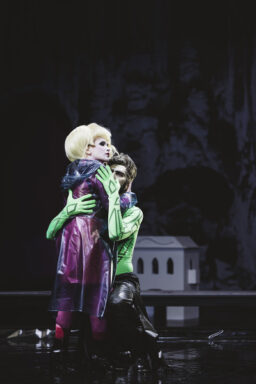 They have death and de-humanisation in common: by tough living conditions, poverty and hard work in Il tabarro, by cruelty and merciless religious rules in Suor Angelica, and by greed and hypocrisy in Gianni Schicchi. Every director faces the problem of the three different plots in the same production. Director Pinar Karabulut chooses a common set for the three acts designed by Michela Flück, a kind of amphitheatre with a heaven-hell-backdrop probably referring to Dante Alighieri’s Divine Comedy. Teresa Vergho created colourful, even lurid costumes out of artificial materials and oversized wigs for most of the performers. Carsten Rüger’s light desgin ranges from sheer darkness for the grim Tabarro to dazzling brightness for Suor Angelica and Gianni Schicchi. The action of Il tabarro is confined to a footbridge around a shallow pond, which only allows for entering and leaving the stage; Personenregie is basically missing for the banal drama of jealousy between the owner of a barge, Michele, his wife Giorgetta and her lover Luigi, who also works for Michele.
They have death and de-humanisation in common: by tough living conditions, poverty and hard work in Il tabarro, by cruelty and merciless religious rules in Suor Angelica, and by greed and hypocrisy in Gianni Schicchi. Every director faces the problem of the three different plots in the same production. Director Pinar Karabulut chooses a common set for the three acts designed by Michela Flück, a kind of amphitheatre with a heaven-hell-backdrop probably referring to Dante Alighieri’s Divine Comedy. Teresa Vergho created colourful, even lurid costumes out of artificial materials and oversized wigs for most of the performers. Carsten Rüger’s light desgin ranges from sheer darkness for the grim Tabarro to dazzling brightness for Suor Angelica and Gianni Schicchi. The action of Il tabarro is confined to a footbridge around a shallow pond, which only allows for entering and leaving the stage; Personenregie is basically missing for the banal drama of jealousy between the owner of a barge, Michele, his wife Giorgetta and her lover Luigi, who also works for Michele.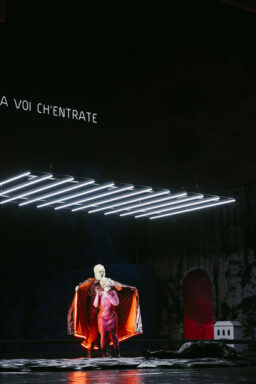 Unlike most productions Suor Angelica comes along as a colourful show in Barbieland rather than a depiction of devout life at a convent. The stage is constantly revolving while the nuns are enjoying themselves, smoking, doing some shopping etc. So Angelica’s fate becomes even more tragic by contrast after the decisive encounter with Zia principessa who reveals that her son had died. Violeta Urmana convinces in a strikingly red coat by compelling playing and singing; she is still able to produce formidable tones in the third part of her long career. Angelica’s suicide is her last resort to join her son in front of the cloudy kitsch of the backdrop but Pinar Karabulut still owes an explanation why it turns into a bloody job between Angelica’s thighs. Her show arrangements of the middle opera result in real Personenregie for the ensemble in the final Gianni Schicchi after the interval to convey all the greed and conniving among the relatives of the passed away Buoso Donati.
Unlike most productions Suor Angelica comes along as a colourful show in Barbieland rather than a depiction of devout life at a convent. The stage is constantly revolving while the nuns are enjoying themselves, smoking, doing some shopping etc. So Angelica’s fate becomes even more tragic by contrast after the decisive encounter with Zia principessa who reveals that her son had died. Violeta Urmana convinces in a strikingly red coat by compelling playing and singing; she is still able to produce formidable tones in the third part of her long career. Angelica’s suicide is her last resort to join her son in front of the cloudy kitsch of the backdrop but Pinar Karabulut still owes an explanation why it turns into a bloody job between Angelica’s thighs. Her show arrangements of the middle opera result in real Personenregie for the ensemble in the final Gianni Schicchi after the interval to convey all the greed and conniving among the relatives of the passed away Buoso Donati. 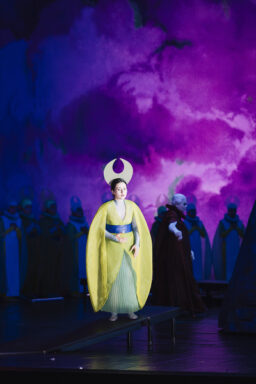 Every character is individually depicted, which offers an opportunity to showcase the talents of the company with Annika Schlicht as particular standout. She is the only singer who appears in all three operas as la Frugola, Suora Zelatrice and Zita. The cast of Il tabarro is top-notch for today’s standards. Carmen Giannattasio was very convincing in Berlin as Elisabetta in Maria Stuarda by Donizetti about ten years ago. She has made a successful career ever since, above all in Italy. Her dramatic soprano meets Giorgetta’s verismo requirements very well. The emerging star of today’s tenor heaven, Jonathan Tetelman, follows suit by contributing terrific top notes as well as vocal fervour.
Every character is individually depicted, which offers an opportunity to showcase the talents of the company with Annika Schlicht as particular standout. She is the only singer who appears in all three operas as la Frugola, Suora Zelatrice and Zita. The cast of Il tabarro is top-notch for today’s standards. Carmen Giannattasio was very convincing in Berlin as Elisabetta in Maria Stuarda by Donizetti about ten years ago. She has made a successful career ever since, above all in Italy. Her dramatic soprano meets Giorgetta’s verismo requirements very well. The emerging star of today’s tenor heaven, Jonathan Tetelman, follows suit by contributing terrific top notes as well as vocal fervour. 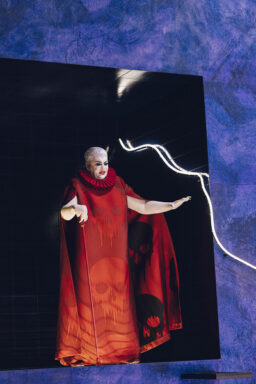 I already fancy him in Verdi and other spinto parts. There is no doubt that Misha Kiria is a good singer, his grim Michele remains a little sketchy in this production; as Gianni Schicchi he is doing his level best to be the humorously smart newcomer. Mané Galoyan is doing the same as Suor Angelica with impressive piani that are usually the final touch of a Puccini soprano but her small lyrical voice can hardly cope with the musically most demanding part of the evening, a Puccini heroine like Butterfly or Tosca which is traditionally sung by primadonnas such as Tebaldi, Lorengar, Scotto or at least Cristina Gallardo-Domas in the last Trittico production of the Deutsche Oper by Katharina Wagner almost twenty years ago. Her soprano is better suited for Gianni Schicchi’s daughter Lauretta but O mio babbino caro suffers from the slow tempo.
I already fancy him in Verdi and other spinto parts. There is no doubt that Misha Kiria is a good singer, his grim Michele remains a little sketchy in this production; as Gianni Schicchi he is doing his level best to be the humorously smart newcomer. Mané Galoyan is doing the same as Suor Angelica with impressive piani that are usually the final touch of a Puccini soprano but her small lyrical voice can hardly cope with the musically most demanding part of the evening, a Puccini heroine like Butterfly or Tosca which is traditionally sung by primadonnas such as Tebaldi, Lorengar, Scotto or at least Cristina Gallardo-Domas in the last Trittico production of the Deutsche Oper by Katharina Wagner almost twenty years ago. Her soprano is better suited for Gianni Schicchi’s daughter Lauretta but O mio babbino caro suffers from the slow tempo.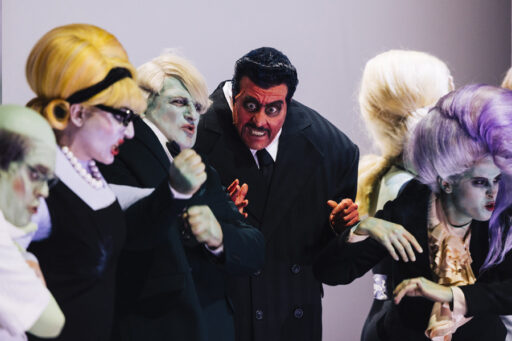 Her lover Rinuccio is sung by the light-voiced Andrei Danilov who is best in the duets with Lauretta. Standing in for Sir Donald Runnicles who had fallen ill, the conductor John Fiore adds a lot of Italianità and makes the Orchester der Deutschen Oper give an intense performance of impressionistic subtleties à la Debussy in Il tabarro, endless lyrical melodies in Suor Angelica and precise pacing for the ensemble piece Gianni Schicchi. The audience obviously enjoyed the opera night, the critic left with mixed feelings about the production. Photo Eike Walkenhorst
Her lover Rinuccio is sung by the light-voiced Andrei Danilov who is best in the duets with Lauretta. Standing in for Sir Donald Runnicles who had fallen ill, the conductor John Fiore adds a lot of Italianità and makes the Orchester der Deutschen Oper give an intense performance of impressionistic subtleties à la Debussy in Il tabarro, endless lyrical melodies in Suor Angelica and precise pacing for the ensemble piece Gianni Schicchi. The audience obviously enjoyed the opera night, the critic left with mixed feelings about the production. Photo Eike Walkenhorst
Deutsche Oper Berlin: “Il Trittico”
